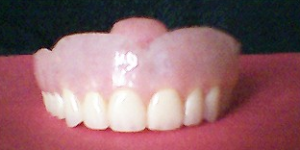If you searched “Dentures Raleigh NC” looking for a solution for missing teeth, you’ve come to the right place at Gover and Gover Dentistry. Dentures, including partials or partial dentures and complete dentures, are dental appliances that are inserted in the mouth to replace missing teeth. In addition to replacing teeth, the denture helps provide support for the cheeks and lips. Full dentures may be prescribed by your dentist if you have lost, or are about to lose, all of your teeth as a result of disease, decay, injury, or surgery. Partials may be recommended if there are still healthy, viable teeth that can be saved.
A partial denture, often referred to simply as a “partial,” only replaces some of the teeth while a full or complete denture replaces all the teeth of either the upper or lower mouth. Finally, there are implant-supported dentures, also referred to as implant-retained dentures, that offer a little more stability by anchoring the denture to the implants.
For a person who has lost teeth but still has viable underlying bone in the jaw in which to affix implants, an implant-supported denture can be a good solution. This is especially true for the lower jaw since standard dentures are not as easy to secure because of the horseshoe-shaped space required to clear the tongue. This is not as much of a problem on upper dentures as the roof of the mouth provides a full surface that tends to naturally suction the denture in place.
The implant-supported or implant-retained denture has special attachments that snap onto the implants to provide structural stability. Implant-supported dentures can be easily removed, but if a more permanent, rigid tooth structure is desired the patient might prefer crown and bridgework. This is one of the key decisions to be determined in your consultation with the Govers as you decide whether to pursue a fixed or removable solution.
What are Dentures and How are they Made?
Dentures, sometimes referred to as false teeth, are custom-made removable dental appliances for multiple missing teeth. Full dentures replace most or all of your teeth, and partial dentures replace one or a few missing teeth. Dentures help provide support for facial muscles and the lips. This support works to maintain the natural aesthetic appearance of the face and smile, helping patients look younger, improve speech, and improve their health.
Dentures and partials are custom made in a dental laboratory after taking impressions of your mouth.
Most dentures have an acrylic base and can be fabricated two different ways – conventional or immediate. A conventional denture is made after all teeth have been extracted and the tissues (gums) have healed. An immediate denture is fabricated and inserted immediately after the teeth are extracted. Then the tissues are allowed to heal under the denture. In this case the denture acts as a “bandage” of sorts to help seal the gums during recovery.
An upper denture has flesh-colored acrylic that covers the palate (roof of the mouth). A lower denture is shaped like a horseshoe to leave room for the tongue. The denture teeth are made of plastic, porcelain or a combination thereof.
Dentures over a normal course of time will wear and need to be replaced or relined in order to keep the jaw alignment normal. The alignment will slowly change as the bone and gum ridges recede or shrink after the removal of the original underlying teeth. As a result, regular dental exams are still very important for the denture wearer to check for any changes or disease in the oral tissues.
With proper care and good oral hygiene, full dentures can last 5-10 years. But over a period of time the mouth naturally changes shape, and dentures will need to be relined, remade, or rebased – a process in which the acrylic base is redone and retrofitted with the artificial teeth of the original device.

